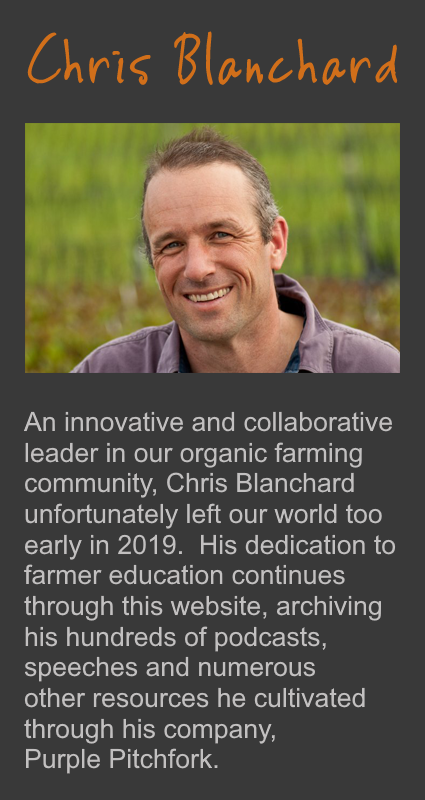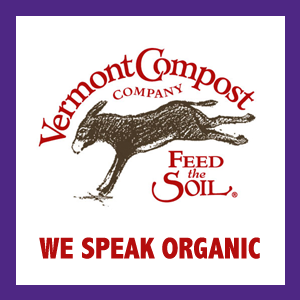Every winter, I look forward to farming conferences, where I get to see old friends, get new ideas, make new connections, and find inspiration for the coming year. I can’t imagine farming without that regular coming together of our smaller and extended communities.
And I’ve never been to a farming conference where I didn’t take away enough information to pay back the time and money I spent to get there. Even for the most expensive conferences, the investment pays back quickly, and the new knowledge becomes a permanent asset that provides returns year after year.
Unfortunately, it’s pretty easy to go a conference and let the knowledge slip right on by. Game-changing suggestions, enriching connections, and even bigger opportunities can easily slip right by, especially when you have to return from an event and get right into the greenhouse or the field. By approaching a conference like an investment, you can make the most of the opportunities and information that come your way.
And I’ve never been to a farming conference where I didn’t take away enough information to pay back the time and money I spent to get there. Even for the most expensive conferences, the investment pays back quickly, and the new knowledge becomes a permanent asset that provides returns year after year.
Unfortunately, it’s pretty easy to go a conference and let the knowledge slip right on by. Game-changing suggestions, enriching connections, and even bigger opportunities can easily slip right by, especially when you have to return from an event and get right into the greenhouse or the field. By approaching a conference like an investment, you can make the most of the opportunities and information that come your way.
Get Ready
Just like anything having to do with farming, you dramatically increase your likelihood of great results by taking a little time to prepare.
Set Goals - Once you’ve decided to go to a conference, decide what questions you hope to get answered. I find that it’s easier to get concrete results if you identify specific questions, rather than just an area of interest: “How should I organize my packing shed to maximize workflow and ergonomics?” rather than, “I want to know more about packing shed organization.”
Plan Your Time - Take time to review the workshops, and plan your attendance. Often, organizers post the conference program, with expanded workshop descriptions and updated schedules, in the days or weeks before an event. Figure out where you are likely to get your questions answered, and what presenters you might want to connect with after their workshop is over.
The exhibit hall can provide a rich source of information, as well. Take time to review the exhibitor listings to decide who you want to visit, and what you hope to get out of each conversation.
Prepare Your Kit - Finally, pack your business cards, a pen, and some paper. When that one key idea or one life-changing contact comes along, you don’t want to be stuck without the tools you need to make the most of it.
Set Goals - Once you’ve decided to go to a conference, decide what questions you hope to get answered. I find that it’s easier to get concrete results if you identify specific questions, rather than just an area of interest: “How should I organize my packing shed to maximize workflow and ergonomics?” rather than, “I want to know more about packing shed organization.”
Plan Your Time - Take time to review the workshops, and plan your attendance. Often, organizers post the conference program, with expanded workshop descriptions and updated schedules, in the days or weeks before an event. Figure out where you are likely to get your questions answered, and what presenters you might want to connect with after their workshop is over.
The exhibit hall can provide a rich source of information, as well. Take time to review the exhibitor listings to decide who you want to visit, and what you hope to get out of each conversation.
Prepare Your Kit - Finally, pack your business cards, a pen, and some paper. When that one key idea or one life-changing contact comes along, you don’t want to be stuck without the tools you need to make the most of it.
At the Show
The show isn’t all about work, but a few key actions can dramatically increase the value you get out of the event.
Engage the Material - You can increase your retention by actively engaging with each workshop you attend, rather than passively receiving information. Interpret key points for how they apply to your specific situation, rather than just writing them down - rather than just writing, “Point shovel points down to move more soil into the row,” add a note: “- would help with weedy broccoli!”
At the end of each talk, I like to take a moment to distill the entire talk down to one key point: “I can build organic matter on my farm by allowing cover crops to get through flowering,” or, “I really need to put together an income statement and balance sheet for my farm, effective January 1.”
Identify Actions - I take prolific notes (it works for me, your mileage may vary), so it can be hard to identify the concrete actions that a speaker helped me realize I need to take. Even where I don’t write down a ton of information, I like to write a dash (-) to the left of each action item; when I scan my notes after the conference, I can quickly identify items to put on my task list, and show that I’ve done it by turning the - into a +.
Ask Questions - Please, ask questions! Speakers dread having a disengaged audience, and there are few things more unnerving than leaving the requested ten minutes for questions at the end of a talk and facing a silent audience. Remember the questions you wrote down in preparation? Now is the time to get them answered. Questions don’t have to be limited to the material just presented,
Make Connections - Be approachable when you aren’t in a session. Don’t immerse yourself in your phone or the conference materials. Likewise, approach people. Everybody’s there to make connections, and a room full of strangers can be a lonely place. Walk right up, introduce yourself, and ask about the other person.
Make the Most of Connections - Use your business cards liberally - handing out a card is a great invitation to get one from somebody else. Take a moment to write down a note on the back of the card so that you remember the context, or something that you would like to follow up with. The value of a conference connection isn’t always apparent, and I’ve benefitted from connections with connections over the years.
Process Connections in Real Time - at the end of each day, empty the business cards from your wallet, quickly sort them into three piles: the first for those that you absolutely plan to follow up with, the second for those that you want to put into your address book, and the third for, “who is this person?” Throw the third pile away, and keep the other two accessible for when you get home.
For the cards in the first group, write a note on the back about your intended action - “send info on L245 for sale,” or “ask for contact for greenhouse company.”
Engage the Material - You can increase your retention by actively engaging with each workshop you attend, rather than passively receiving information. Interpret key points for how they apply to your specific situation, rather than just writing them down - rather than just writing, “Point shovel points down to move more soil into the row,” add a note: “- would help with weedy broccoli!”
At the end of each talk, I like to take a moment to distill the entire talk down to one key point: “I can build organic matter on my farm by allowing cover crops to get through flowering,” or, “I really need to put together an income statement and balance sheet for my farm, effective January 1.”
Identify Actions - I take prolific notes (it works for me, your mileage may vary), so it can be hard to identify the concrete actions that a speaker helped me realize I need to take. Even where I don’t write down a ton of information, I like to write a dash (-) to the left of each action item; when I scan my notes after the conference, I can quickly identify items to put on my task list, and show that I’ve done it by turning the - into a +.
Ask Questions - Please, ask questions! Speakers dread having a disengaged audience, and there are few things more unnerving than leaving the requested ten minutes for questions at the end of a talk and facing a silent audience. Remember the questions you wrote down in preparation? Now is the time to get them answered. Questions don’t have to be limited to the material just presented,
Make Connections - Be approachable when you aren’t in a session. Don’t immerse yourself in your phone or the conference materials. Likewise, approach people. Everybody’s there to make connections, and a room full of strangers can be a lonely place. Walk right up, introduce yourself, and ask about the other person.
Make the Most of Connections - Use your business cards liberally - handing out a card is a great invitation to get one from somebody else. Take a moment to write down a note on the back of the card so that you remember the context, or something that you would like to follow up with. The value of a conference connection isn’t always apparent, and I’ve benefitted from connections with connections over the years.
Process Connections in Real Time - at the end of each day, empty the business cards from your wallet, quickly sort them into three piles: the first for those that you absolutely plan to follow up with, the second for those that you want to put into your address book, and the third for, “who is this person?” Throw the third pile away, and keep the other two accessible for when you get home.
For the cards in the first group, write a note on the back about your intended action - “send info on L245 for sale,” or “ask for contact for greenhouse company.”
When You Get Home
You’ll get the most from the conference if you follow up in real time, while the information and connections are still fresh. Reviewing your notes, information, and connections shortly after the event is a great way to increase retention and internalize important messages - and makes certain you don’t get caught up in the work that’s waiting when you get back before you have a chance to fully realize the value of being at the event. By changing the context and the format of the information, your brain uses different pathways to log the same information, improving your ability to remember and access it later.
Identify Actions - Shortly after you get home, pull out those notes. Review the actions you identified, decide if they are still meaningful, and put them into your task management system.
Follow Up with Connections - For the cards that you made notes on about following up, make that happen. Waiting until weeks after the conference allow you to slip from their minds, and any urgency they feel to respond to you can easily go by the wayside. Add everybody else to your address book, and consider reaching out to them on Facebook or through a quick email.
***
A good conference can be a great place to get inspired, chase some intellectual rabbit trails, and meet a ton of new people - but that’s not worth the price of admission all by itself. Those of us in the world of farming have chosen a life where knowledge and connections can turn into real actions to improve the planet, provide real food, and build community, as well as to provide a return to our businesses. A little bit of additional effort - before, during, and after the event - can provide a real boost to the outcomes a conference creates on your farm and in your life.
Identify Actions - Shortly after you get home, pull out those notes. Review the actions you identified, decide if they are still meaningful, and put them into your task management system.
Follow Up with Connections - For the cards that you made notes on about following up, make that happen. Waiting until weeks after the conference allow you to slip from their minds, and any urgency they feel to respond to you can easily go by the wayside. Add everybody else to your address book, and consider reaching out to them on Facebook or through a quick email.
***
A good conference can be a great place to get inspired, chase some intellectual rabbit trails, and meet a ton of new people - but that’s not worth the price of admission all by itself. Those of us in the world of farming have chosen a life where knowledge and connections can turn into real actions to improve the planet, provide real food, and build community, as well as to provide a return to our businesses. A little bit of additional effort - before, during, and after the event - can provide a real boost to the outcomes a conference creates on your farm and in your life.




 RSS Feed
RSS Feed
